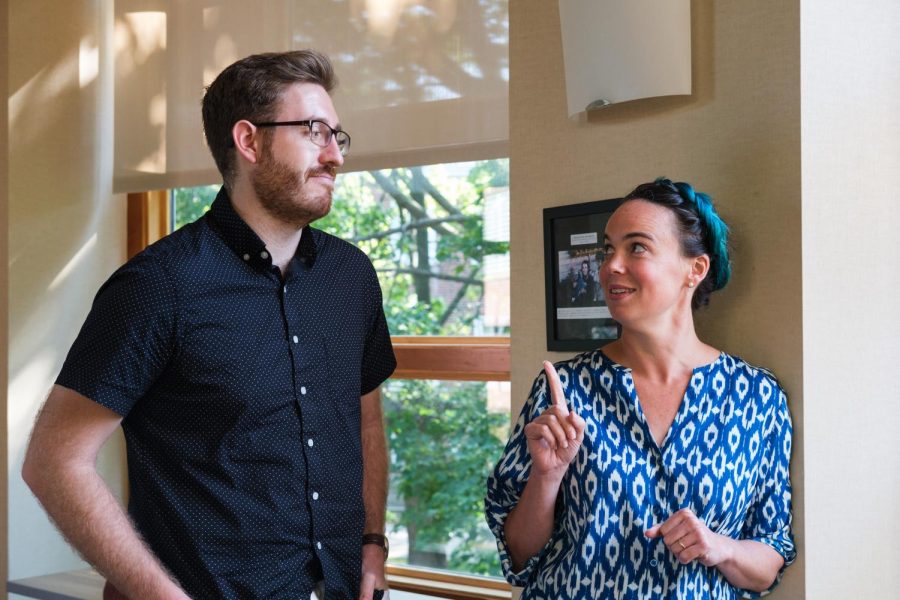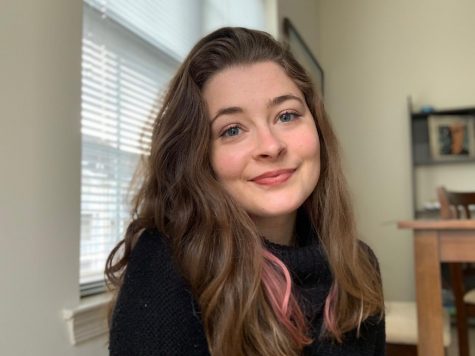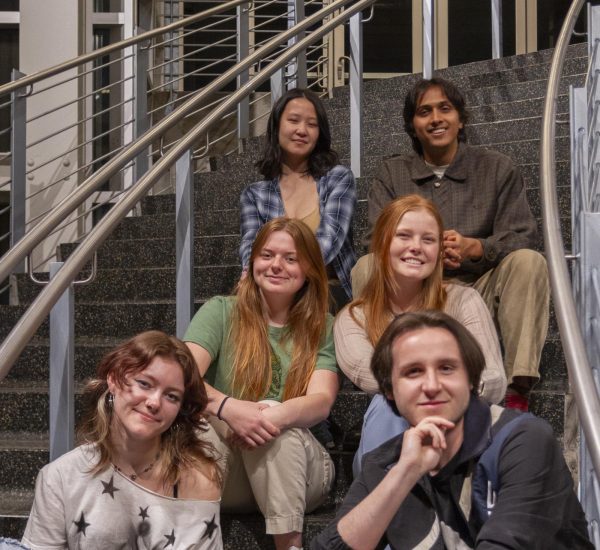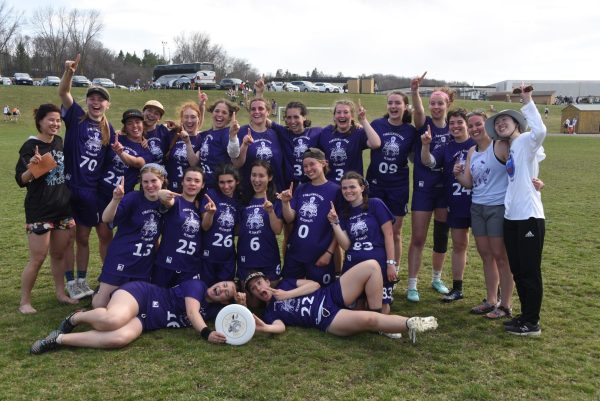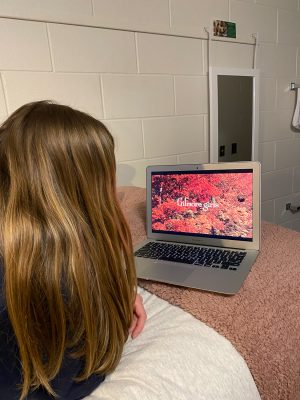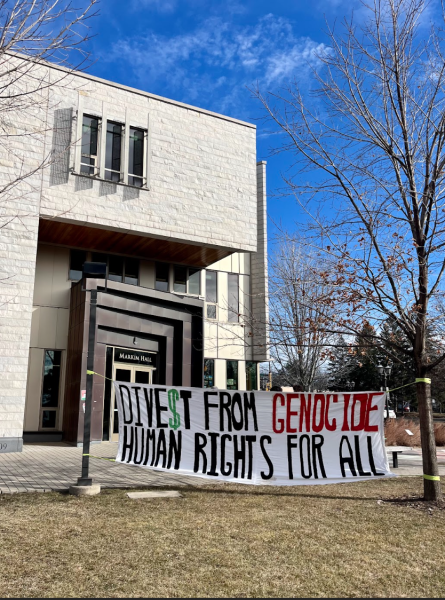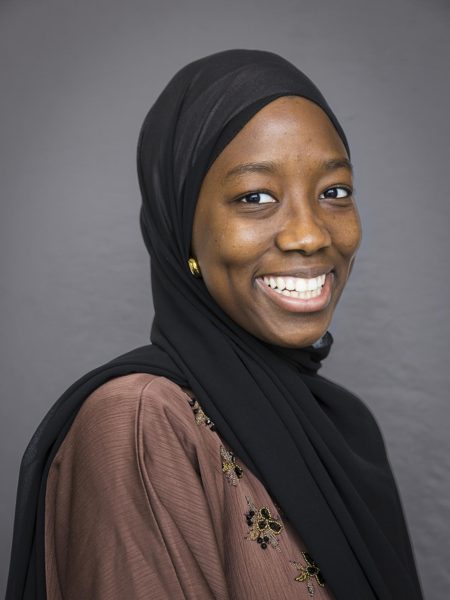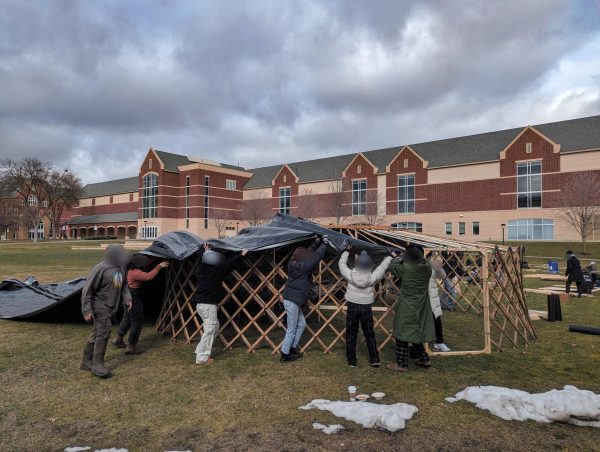New group ‘Unlearning White Supremacy’ replaces White Anti-Racist Identity Collective
Unlearning White Supremacy participant Kyle Flowers and staff facilitator Isabel Nelson. Photo by Kori Suzuki ’21.
September 19, 2019
Starting this semester, the White Anti-Racist Identity Collective is no more. The group has evolved into a community cohort called Unlearning White Supremacy — the new name and structural shift signifies several changes within the framework of the group.
Since 2002, Macalester’s student-organized identity collectives have been a space for people from marginalized identities to come together for a sense of community and support. So when Associate Director of Admissions Events Isabel Nelson volunteered to become the staff facilitator of the White Anti-Racist Identity Collective in Fall 2018, she began to doubt the relevance of an identity collective specifically for white people.
The Department of Multicultural Life (DML) has no record of when the group formed; identity collectives emerge organically according to student interest. It advertised itself as a space for white people who wanted to have conversations about white privilege and dismantling white supremacy. It was initially called just White Identity Collective; the ‘anti-racist’ label was added later, in 2016. The name gave some people the wrong ideas about the group’s intentions.
“A lot of people, in hearing ‘White Identity Collective’ thought it was about white power or white supremacy,” Associate Director of the Lealtald-Suzuki center and co-organizer of the group Tegra Myanna said. “There was just this weird association with the name, that if you weren’t laughing about it, it made you kind of uncomfortable as a person of color on campus.”
But even after the name changed to include the ‘anti-racist’ disclaimer, Nelson and Myanna questioned the usefulness of an all-white identity collective.
“I think [the White Anti-Racist Identity Collective] moved away from what the goal and focus of the identity collective program is, which is in-community connection and collaboration and talking about experience,” Myanna said. “I’ve wondered about its role as an identity collective and … why it wasn’t a separate dialogue program outside of the identity collective space.”
The organization also had an attendance problem. It averaged around two or three participants each week, who were almost always staff; faculty and students rarely showed up. So after Nelson took over as staff facilitator in fall 2018, she and Myanna began to brainstorm how to create a group for anti-racist dialogue that existed outside of the identity collective umbrella.
“Unlearning White Supremacy” is now a biweekly commitment, where participants are expected to show up every other Tuesday during the lunch hour for conversations. This differs from the identity collective model, which gives participants the freedom to drop into meetings whenever they want.
“When you’re working on identities of privilege you need the repetitive multiple conversations,” Myanna said. “It’s like being in the classroom, you have to be able to engage and dive deep and that requires commitment to show up more than once or twice a semester.”
The new group is also open to all racial identities, not just white participants.
The book “Me and White Supremacy” by Layla Saad influenced many of the ideas behind the new group. The book, available for free online, consists of journaling prompts that ask white people to examine and reflect upon their privilege.
The group will run biweekly until the end of the Fall semester. It will then assign a book focused on anti-racist education for participants to read over January term, and will reconvene in the Spring to discuss what they read.
Myanna and Nelson noted that the response to the group so far has been largely positive, with many people reaching out with interest and questions.
“I think that first day I got seven emails from staff, faculty and students expressing interest,” Nelson added.
The first meeting, which took place on Tuesday, September 18th, attracted 14 attendees, two of whom were students.
Nelson and Myanna hope that the group will become part of a larger movement on campus that challenges white supremacy at Macalester and in the world. They plan to collaborate with the Diversity, Equity and Inclusion task force and host dialogues with classes focused on similar topics.
“There’s a lot of work around diversity, equity and inclusion happening in different pockets on campus, and those pockets don’t always talk to each other,” Nelson said.
When Nelson stepped up to lead the White Anti-Racist Identity Collective in 2018, she said it was to hold herself accountable to her own commitment to unlearning white supremacy. She signed up for the White Anti-Racist Identity Collective in 2016, but never showed up to the meetings. She believed that stepping up to lead the group would allow her to find a community that supports each other in their commitment to being allies in the fight for racial justice.
“I was like, this is gonna make me show up, and I need to start showing up,” Nelson said.
“There’s no excuse.”

